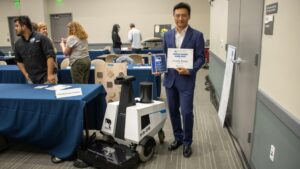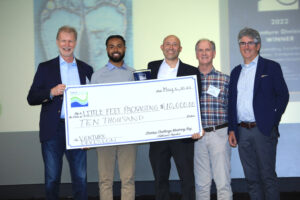Daniel Plon is a Master of Social Work student at California State University Monterey Bay and the founder of 3-4:30, a mobile app that makes timed, rapid introductions between employers and candidates in high-turnover occupations.
Daniel first came up with the idea for 3-4:30 several years ago while looking for work at a restaurant. After meeting the hiring manager of the restaurant and learning about his hiring troubles, Daniel was inspired to start researching the job market and his idea for 3-4:30 was formed.
He is currently working on completing the prototype for his app, which will serve employers and potential employees in the hospitality sector. Daniel will also be pitching his business at this year’s Startup Challenge competition.
We sat down with Daniel to learn about his experience starting a business as a student, what he looks forward to most about participating in Startup Challenge this year, and his hopes for 3-4:30 in the future.
iiED: What has your experience been starting a business while being a student?
Daniel: It’s tough. You’re kind of juggling more. I mean, it’s self-imposed, obviously. But there are times where I think it would be great if I could just focus on one or the other. I’m making a prototype right now, so sometimes I just get so absorbed into that I don’t really want to stop and do my homework, which I need to do. But yeah, you just have to be better at time management, which I’m still improving on.
iiED: You plan on participating in Startup Challenge this year. What are you looking forward to about the experience?
All of it. I’ve never been a part of something like that, so it’s just a new environment. I’m going to meet a lot of different people. I’m probably going to learn a great deal. And I think a lot of things that seem foreign to me will become familiar by the end of it. With what I’m doing now and what I do in the future, I think it’ll help a lot down the road as well.
iiED: What are your hopes for 3-4:30 in the future?
Daniel: That people will find it as useful as I hope they will. It’s got a very unique revenue model. Nothing else that I’ve discovered, and I’ve put a lot of effort into researching, utilizes something like this.
I think it’s more about connecting individuals than it is about connecting employers and potential employees. I’m really taking an individualistic approach to this and trying to find the sweet spot that can bring the two together in a fast, easy, and affordable way.
iiED: What advice would you give to other students who are interested in starting a business?
Daniel: Don’t give up. I think I’ve given up on this a dozen times already, but I keep coming back to it. I think what happens to a lot of people when they start a business or people that invested a lot of time and energy into one, they can be kind of blind to certain realities that they’re going to come across, precisely because they don’t want to have lost all that time and effort in vain. But you don’t have to. You can adjust, you can adapt, and your idea can become something more than what you originally envisioned. So yeah, be adaptable, be imaginative, and try to have fun with it.
iiED: Is there anything else you’d like to share about your business?
Daniel: There’s a lot I want to share about it, but I don’t think I should because I don’t want to let the cat out of the bag just yet. But again, it is a very unique kind of model that is a fraction of the cost that you could ever hope to find anywhere else. I think it works really well in any occupation that has really high turnover rates.
I’m really taking a close look and listening to both workers and proprietors at single-unit establishments. I’m focusing that 70% of the market is really single-unit mom and pop owned establishments. And the other 30% is fast-food chains and I think you could sprinkle in some high-class restaurants as well, fine dining establishments too. And this is really for the 70% rather than the top 30% because I feel like they get overlooked whenever a new app comes out, whether it’s on-demand apps. I think for restaurants their pinpoints are that existing job boards and on-demand apps are too expensive. Interview scheduling requires a lot of back and forth. Job supply is greater than demand right now, which is a problem in itself. They also suffer from absenteeism.
And for restaurant workers, you know, 76% of employees want to leave the industry because of low-paying wage theft. They’re overworked, have unpredictable schedules, and there’s limited growth opportunities and job security. There’s a slow application process and lack of agency, so there’s a strong psychological component to this as well. And we’re going to integrate that into the app and how people use it.
We look forward to seeing Daniel’s pitch for this year’s Startup Challenge. Startup Challenge is an annual competitive business accelerator for new businesses that teaches, coaches, mentors, networks, and connects entrepreneurs to the knowledge and resources they need to succeed in the marketplace.



